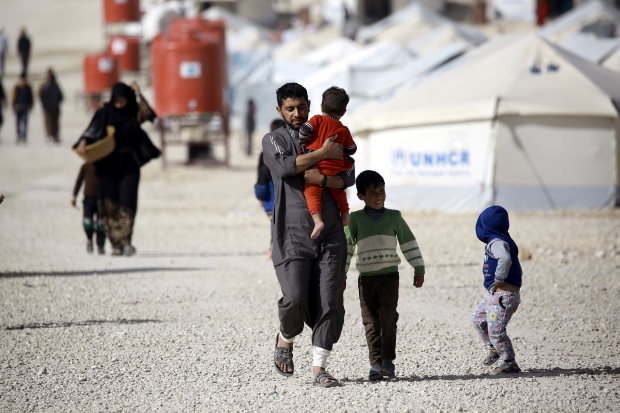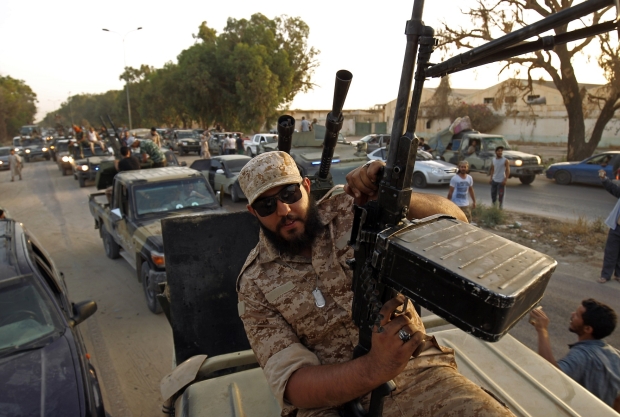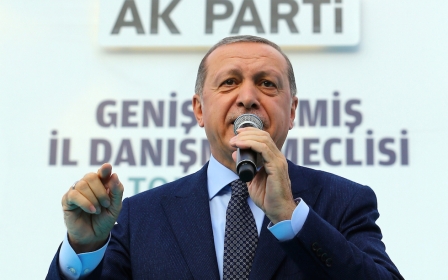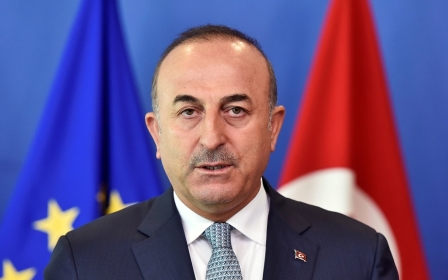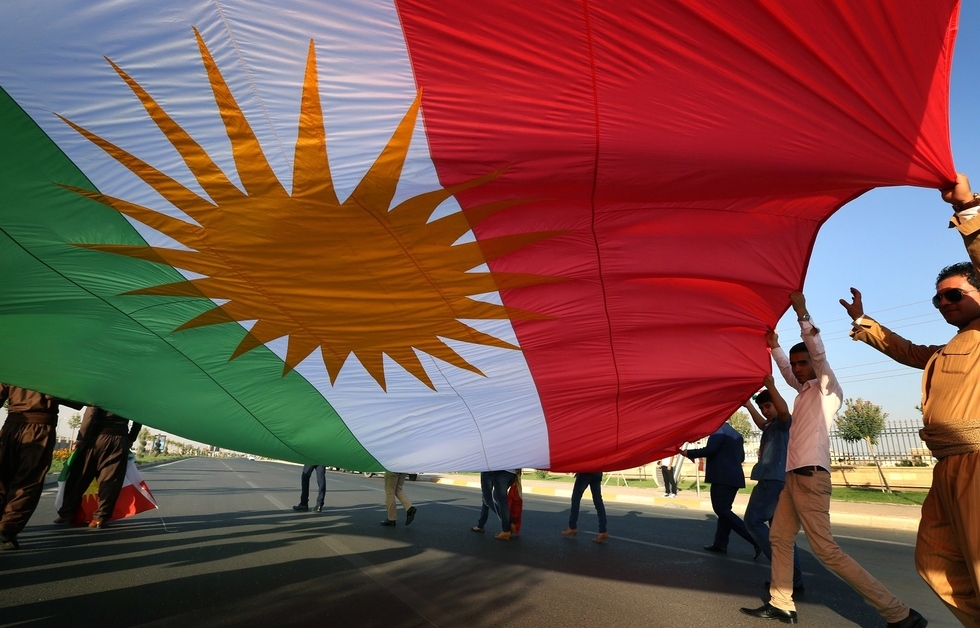
Break-up of the Middle East: Will we see a new regional order?
It is now a cliche to say that the Middle East and North Africa are deeply fragmented. Indeed they are. But this claim shouldn’t obscure the fact that the region has not been so interconnected at any time since World War I, the conflict which more or less shaped regional geopolitics ever since.
Despite all the talk of breakups, Middle Eastern borders have proven to be tenacious. They have resisted the pressure of regional disorder.
And yet order in the nation-states underpinning these borders is crumbling. New forms of political authority and autonomous regional entities are emerging across the region.
The roots of fragmentation
The idea and nature of sovereignty is rapidly changing. No longer are central governments or well-entrenched regimes the sole contenders for sovereignty. Though post-colonial borders remain in place, sovereignty within nation states in the region has been shared and challenged at three levels.
At the national level, there are various groups that assert their sovereignty over certain territories. Take Syria: the regime, the opposition, the Kurdish Democratic Union Party (PYD) and Islamic State (IS) all have territorial enclaves of their own, where they exert sovereignty. Likewise, both Libya and Yemen have been effectively turned into regionalised states.
Though the external borders of these states remain intact, there are internal borders that delineate the sharing of sovereignty among these actors, leading to the atomisation of sovereignty.
This trend creates new domains within each national context throughout the region, from Libya to Yemen and from Iraq to Syria. And while the emergence of new independent states is unlikely, previously centralised states are reconfiguring their political power structures, as seen with emergence of sub-national territorial entities.
At a regional level, both Iran and Turkey are using their foreign policies to directly limit the sovereignty of Syria. Iran exerts major influence over Syrian sovereignty both through its affiliate militia groups and deep influence over the Syrian security apparatus, if not the state structure as a whole. Likewise, Turkey now has an enclave of its own in Syria as a result of its Operation Euphrates Shield. Likewise, Egypt and the United Arab Emirates have violated the sovereignty of Libya, while Saudi Arabia, UAE and other allied powers are doing the same in Yemen.
It is more appropriate to call Syria, Yemen and Libya fractured states, or even proto-states, rather than sovereign states
The border sovereignty of these countries nay remain intact from the perspective of UN or international law - but the policies of these international powers make a mockery of the concept.
Both Russia and the United States have infringed on the very idea of sovereignty in Syria, despite the fact that Moscow claims that its activities are undertaken with the full permission of Damascus.
It is more appropriate, therefore, to call Syria, Yemen and Libya fractured states, even proto-states, rather than sovereign states. They may be territorial entities with clear-cut borders, but are unable to exert full sovereignty over these territories, at least not to their full extent nor not on their own.
This national disorder is taking place within the larger framework of regional disorder. Since the start of the Arab uprisings, the region’s authoritarian status quo has been shaken to its core, but a new regional order has yet to emerge.
The region is passing through a geopolitical vacuum, leading to deadly rivalries among the major regional powers - particularly Saudi Arabia and Iran - and causing the intensification of damaging proxy wars, which are destroying the fabric of Middle Eastern societies, weakening state structures and poisoning inter-state relations.
This picture has given rise to the claim of fragmentation of the region – so much so that it is now hackneyed to even raise the point. Developments during recent years, from refugee influxes to the rise of IS, have only aggravated a trend which is set to become more acute.
The reversal of this trend is an uphill battle: instead, we would be better-served if we change our ideas about the fragmentation. It is here that the region can create an opportunity from one of its many challenges.
Forces of interconnection
Fragmentation means the crumbling of the national and regional order and the breakdown of state authority. But – and this might sound paradoxical - it can also mean interconnection.
Put it another way: more than ever, the region is becoming chaotically interconnected.
In recent years, when speaking of the breakup of the region, the focus has mostly been on the Arab uprising that evolved into civil wars. Exacerbated by regional and international power struggles, these conflicts fractured both the region’s states and their societies.
But there are other, more structural roots behind regional fragmentation – or interconnection, which have been at the heart of the modern Middle Eastern state system since its inception and only been aggravated by recent disorder.
Take the Kuridsh issue. Spread across Turkey, Iran, Iraq, and Syria, Kurdish national movements have undertaken armed insurgencies since the early 20th century, when the modern Middle Eastern state system was established.
The Kurdish community may have been spread across four countries, but it has had a demographic and geographic continuity which transcends borders. This transnational cohesion of Kurds has put significant pressure on the borders of these countries, despite the fact that they had invested significant resources and energy in strengthening and securitising their borders.
Since the the Arab uprisings, the Kurdish issue has become more interconnected than ever at a regional level while the transnational nature of Kurdish groups has gained further momentum.
The Kurdistan Worker’s Party (PKK) - which emerged in, and was intended to fight against Turkey - is now the umbrella organisation of the most powerful Syrian Kurdish group, the Democratic Union Party (PYD), and has another offspring in Iran, the Party for Free Life in Kurdistan (PJAK).
The PKK’s policies and strategy are no longer driven just by its policies towards Turkey: if anything, Anakara's Kurdish peace process largely came into being, then crumbled, as a result of developments in Syria.
At the grassroots level, a regional Kurdish public sphere has emerged particularly as a result of the fight against IS.
The interconnectedness of the Kurdish issue at a regional level forces countries with large, restive Kurdish populations to design policies which deal with the Kurdish issue together, given the looming spectre of regional upheaval. It is no longer an option to devise policies in a silo.
As the issue has become deeply regionalised, with a strong international dimension, the solution has to be regionalised as well. And this is intimately linked to how the post-crisis Middle Eastern state system will address the question of the different identity groups – major and minor ones - in the region.
To state it differently, the Kurdish issue, long seen as one of the primary sources of the fragmentation in the Middle East, is forcing affected countries to think of the region in a deeply interconnected way while formulating policies to address this issue.
Conjectural roots
Moving from such structural sources of the fragmentation-interconnection to a more conjectural one, the issues of the borders, refugees, and non-state actors come to the fore. For instance, the porousness of Syria’s borders are not only of concern to Syria itself. It is also a concern to Turkey, Iraq, Jordan and Lebanon.
Likewise, the refugees are both the outcome as well as the cause of this fragmentation. According to the UNHCR, Turkey has more than three million registered Syrian refugees, Lebanon more than one million, Jordan close to 700,000, and Iraq around 250,000. Unfortunately, so far there has been little effort spent on how to create a collective framework to deal with this common issue.
As all the countries bordering Syria are experiencing the same challenges in managing the refugee issue and border security, it might be better to invest more time and energy at the regional level to create a collective framework to deal with this issue, at least creating mechanisms that will enable the sharing of good practices amongst the countries concerned on issues of common interest.
There have already been several suggestions for such a collective effort over the management of migration in the region. For instance, Filippo Dionigi of LSE has suggested the creation of a regional compact for the protection of refugees in the Middle East, which represents one such proposal. Despite this scarce but encouraging scholarship on a region-wide framework, regional policy coordination over refugees remains underdeveloped, if not completely non-existent.
Non-state actors
Likewise, given the trans-border and transnational nature of most of the non-state actors involved, a regional framework is essential for dealing with this question. In Syria, even the most avid observer of Syrian affairs has lost track of numbers of non-state actors in the country. In a similar vein, it is more appropriate to speak of militia armies instead of militia groups when we speak about the phenomenon in the wider region.
The Houthis in Yemen and Hezbollah in Lebanon are acting more like states and armies than non-state actors. Likewise, in Libya, the number of militias are in the range of hundreds of thousands. The Libyan National Army, the Benghazi Brigade, the Libyan Dawn Alliance, Al-Bunyan Al-Marsous, and Zintan are just a few of the key armed groups we could name in Libya.
It is obvious by now that not all these non-state actors are going to be eradicated. In fact, not all these actors should be seen through a negative lense
It is therefore obvious by now that not all these non-state actors are going to be eradicated. In fact, not all these actors should be seen through a negative lense. Such an approach would disregard the nature of the state or regimes that have produced these actors in the first place. The complicated nature of these non-state actors should invite the countries of the region to come together to agree on a framework on the principle of the elimination and/or integration of these non-state actors into the state structure.
There is a widely shared understanding amongst both regional and international players that Islamic State and Al Qaeda should be eradicated. But this consensus falls apart and the situation gets murkier, for instance, when we discuss Shia militias or the Kurdish PYD.
The phenomenon of Shia militias in Iraq and Syria has become a contentious issue. Even on the question of the Hashd al-Shaabi (Popular Mobilisation), which officially have been integrated into the Iraqi security architecture but still largely operates independently, there is no consensus to be found. Some experts draw a distinction between the Hashd al-Shaabi groups that owe their allegiance to national frameworks or religious authorities, and those owe their allegiance to the Veliyi Fakih, Khamanei, or the institution of the Wilayat al-Faqih, or rule of the jurists.
Fragmentation of states feeds mutual insecurity amongst the players of the region. But if this process is seen through a different prism, in terms of providing regional interaction and interconnection, this may lead to a dialogue on how to attain mutual security in the region.
Win-win?
The post-IS period, at least in its territorial form, will be crucial in this respect. It will either lead to further fragmentation through the further intensification of rivalries and proxy wars - with each actor operating within the regional framework in an isolated manner and seeing the as a zero-sum game - or to beneficial discussion on assuring mutual interests. In this sense, the region is not just fragmented. It is also intimately interconnected, arguably more so than at any time since World War I.
In fact, we are witnessing to the regionalisation of the issues and challenges - from identity struggles, to refugees, to border security, to radicalism - in the MENA region. The responses of the states and political elites will define whether such regionalisation of the issues will sow the seeds of some kind of regionalism down the road.
We will be thus better served to situate the discussion of the fragmentation of the MENA region within a more appropriate framework: the forces of disorder and interdependence go hand in hand. The regional political classes’ actions will decide which side of this process gains the upper hand.
By adopting a novel approach to fragmentation in the region, governments can view the dynamic of interconnection and loss of state authority as more than a zero-sum game: instead, they will be able to see it through a win-win mindset. This would open up a new chapter in our understanding of regional affairs.
- Galip Dalay works as a research director at al-Sharq Forum and senior associate fellow on Turkey and Kurdish Affairs at the Al Jazeera Centre for Studies.
The views expressed in this article belong to the author and do not necessarily reflect the editorial policy of Middle East Eye.
Photo: Iraqi Kurdish demonstrators wave a large Kurdish flag during a protest demanding for the independence of Kurdistan outside the United Nations offices in Irbil, the capital of the autonomous Kurdish region, on 23 August 2014. About 700,000 Iraqis have gathered in the Kurdish north after being driven from their homes by Islamic State (IS) fighters, the UN said as it stepped up a massive aid operation to the region. (AFP)
This article is available in French on Middle East Eye French edition.
New MEE newsletter: Jerusalem Dispatch
Sign up to get the latest insights and analysis on Israel-Palestine, alongside Turkey Unpacked and other MEE newsletters
Middle East Eye delivers independent and unrivalled coverage and analysis of the Middle East, North Africa and beyond. To learn more about republishing this content and the associated fees, please fill out this form. More about MEE can be found here.


